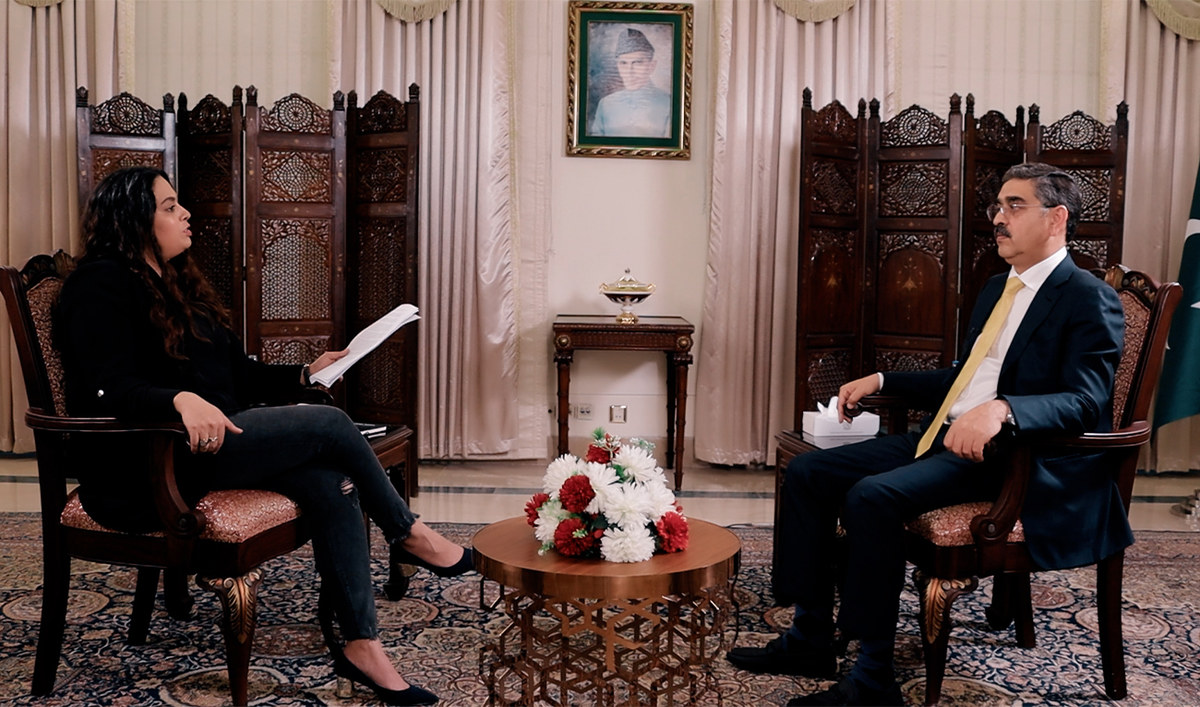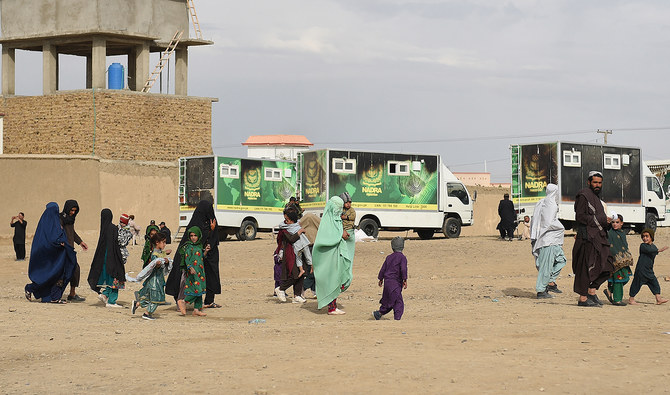ISLAMABAD: Pakistani Prime Minister Anwaar-ul-Haq Kakar has said Afghan applicants for special visas to the US and other western nations had a right to stay in Pakistan for a “limited time,” adding that Islamabad was working with Afghan groups to reach an “agreement” to protect those who face the risk of persecution at home.
Pakistan had set a Nov 1. deadline for all illegal immigrants, including some 1.73 million undocumented Afghans, to leave the country or face forcible expulsion. Since the passing of the deadline, tens of thousands of Afghans have left the country, which has hosted over 4 million Afghan refugees since the Soviet invasion of Kabul in 1979.
About 600,000 Afghans have also crossed over into Pakistan since the Taliban took over Kabul in 2021 after the hasty pullout of US and its NATO allies that ended America’s longest war. Among them, over 20,000 await the processing of applications for US Special Immigration Visas (SIVs) or resettlement in the United States as refugees. These include many who used to work for the US and NATO allies and fled Afghanistan fearing retribution at the hands of the new government, as well as former translators, journalists, women activists and other professionals.
Speaking to Arab News in an interview this week, Kakar, who is heading a caretaker government tasked to oversee general elections in February, said Afghan nationals associated with the US and other western nations who were waiting for visas would not be deported, nor would at-risk individuals like artists, journalists and women rights activists.
Under US rules, applicants for special visas or refugee resettlement requests must first relocate to a third country for their cases to be processed, which can take up to 14 to 18 months. In this case, thousands of Afghan applicants have been waiting in Pakistan for over two years for US officials to process their visa applications.
“There are many western countries, including the US,” Kakar said when asked to confirm if the US embassy had shared the names of over 25,000 Afghans it had requested Pakistan not to deport.
“There are Afghan nationals who … wanted to initiate the process for their visas to these respective countries and they’re doing it and Pakistan is facilitating that process.”
This is the first time a Pakistani official has confirmed Islamabad is working on a mechanism to manage Afghans seeking special US visas or refugee relocation or who risk persecution if returned to Afghanistan.
“They are not illegal aliens … someone who has either worked [in these countries] or the requests are being processed through the US embassy or UK mission or Canadian authorities or anyone for that matter, so they do have a legal right to stay here for a short while, for a limited time, till their applications are processed and that does provide them a legal cover.”
When questioned about requests by many Western embassies and the United Nations to identify and protect at-risk Afghans, Kakar said a “vulnerable” category, which included journalists, artists and women rights activists among others, had already been identified by the government.
“And we’re not sending them back,” the PM added.
“The actual database of such individuals is with the MOI [ministry of interior]. We are working with certain Afghan groups, they are providing the data and we are agreeing on an arrangement … but at the same time we have got a challenge that it should not be abused, this policy, and everyone should not come in and identify themselves in a vulnerable category.”
The PM declined to provide details of the steps taken to identify and protect those in the “vulnerable category.”
Responding to allegations that many Afghans with Proof of Registration (PoR) cards or Afghan Citizenship Cards — documents that allow them to live in Pakistan legally — were also being deported or harassed and arrested, the PM admitted the enforcement of the resettlement plan had opened up space for “human errors” and “malpractice by government agencies.”
“We will rationalize that policy and if there are such instances, we will look into that and we will correct if some harm is done to any individual or individuals for that matter,” Kakar said.
“We have a sort of a monitoring system. I have clearly issued instructions to all the four IGPs [inspectors general of police] in different provinces that they have to ensure that there has to be transparency.”
He declined to share details of the monitoring system.

Pakistani Caretaker Prime Minister Anwaar-ul-Haq Kakar (right) gestures during an interview with Arab News Pakistan Editor Mehreen Zahra-Malik in Islamabad on November 6, 2023. (AN Photo)
“WE OWN IT”
The sudden expulsion order against illegal migrants, announced on Oct. 3, came after suicide bombings this year that government officials and police investigators had said involved Afghans, though without providing evidence.
When announcing the Nov. 1 deadline, Pakistani Interior Minister Sarfraz Bugti said 14 of 24 suicide bombings in the country this year were carried out by Afghan nationals. Other officials have also variously accused Afghan nations of involvement in militancy, smuggling and petty crimes.
“The security aspect is one of the aspects of these illegal aliens,” Kakar said, doubling down on accusations that undocumented Afghan nationals were a security threat.
“But the issue is, along with the security [concerns], there was no visibility whatsoever of these illegal aliens in our database. We didn’t know whether they are positive contributors to our society, negative contributors to our society.”
The PM said the Taliban government had been informed in advance about the decision to expel illegal migrants, and Afghans could return to Pakistan once they had valid identity documents issued by their government and Pakistani visas.
“All we want is that there should be a rational, legal, regulated movement,” Kakar said.
“In the long run ... they [Afghans] would realize the benefit of that dignified interaction with the Pakistani state as compared to as an illegal alien and the kind of a situation they face right now.”
The prime minister denied the expulsion decision was taken by Pakistan’s army — which has a central role in political affairs and security decision-making in the country — and said it was a “wholesome” decision in which all institutions, including the military, had given input:
“The current caretaker government is taking the lead in this campaign and we own it.”
To a question on why the government had given a 30-day deadline for illegal migrants to leave and whether it was “reasonable or fair,” the PM said:
“It is one of the pressures which is on a caretaker government because our own stint was limited and we do have that sense, so we wanted to do it during our tenure. This is one of the reasons that we gave a limited time. If we would have been an elected government, probably the situation would have been different.”












